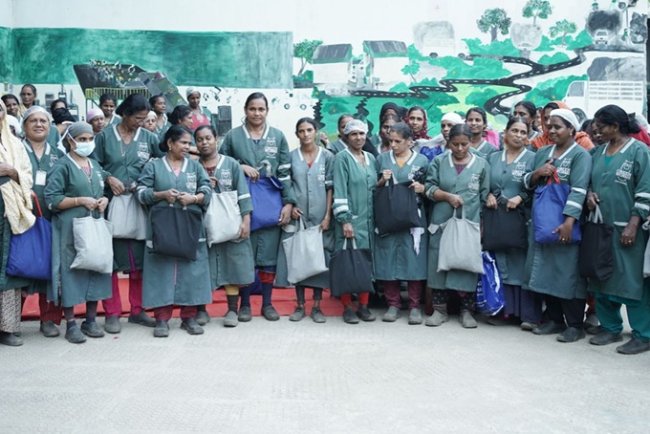Ingka Group Unveils Net Zero Plan to Cut Emissions
Ingka Group unveils a Net Zero Transition Plan to cut emissions by 50% by 2030, aiming for a sustainable future.

Ingka Group, the biggest retailer of IKEA, has reaffirmed its sustainability commitment by revealing its Net Zero Transition Plan. The strategy establishes a bold goal to reduce absolute greenhouse gas (GHG) emissions from its value chain by at least 50% by fiscal year 2030, based on a fiscal year 2016 baseline, with the long-term aspiration to reach net zero by 2050. The effort supports the 1.5°C target of the Paris Agreement, demonstrating the company's commitment to being a leader in addressing climate change.
The newly published plan maps out a coherent decarbonization roadmap across store operations, building, mobility, and investments. It determines critical sources of emissions and puts forward tangible solutions to mitigate them. By making sustainability a core business model, Ingka Group wants to reinvent its operations and serve as an example to other multinational companies.
A significant part of the strategy entails scaling up zero-emission deliveries and investing heavily in renewable energy. Ingka Group is going to expand renewable heating and cooling systems in its operations to reduce its dependence on fossil fuels. The company is also strengthening governance structures by integrating sustainability into top management decision-making, so that climate objectives remain a top priority within leadership at the highest level.
As part of its pledge to transparency and accountability, Ingka Group is evaluating climate risks and opportunities with the Taskforce on Climate-related Financial Disclosures (TCFD) framework. This enables the business to rigorously examine climate-related financial consequences, making it more resilient in the context of changing environmental threats.
Simon Henzell-Thomas, Ingka Group's Climate & Nature Manager, highlighted the value of cooperation in the realization of such aggressive climate targets. "As a multinational company, we have a role to play in driving to net zero. But we cannot do it by ourselves. Climate change does not recognize borders—we need to work together across sectors to create real change," he added. His appeal for collective action highlights the imperative for policymakers, businesses, and consumers to collaborate in hastening the shift towards sustainability.
Ingka Group is working actively to push governments and industries to adopt more ambitious climate agendas consistent with the 1.5°C target. It is calling for an immediate phase-out of fossil fuels and greater use of renewable energy sources. Additionally, the company is pushing for policies that facilitate sustainable transport, food systems, circularity, and sustainable forestry. These are important steps, Ingka Group believes, towards building a regulatory framework that helps companies achieve their sustainability goals.
The push by the company for policy changes precedes COP30, where world leaders will gather to talk about climate action. By standing firm now, Ingka Group aims to shape important decisions that can spur systemic change across sectors. The company is of the view that businesses cannot do it alone to reach net zero—government action and consumer behavior changes are just as important in guaranteeing significant progress.
Ingka Group has already taken great leaps in minimizing its environmental footprint. Since 2016, the company has reduced its overall climate footprint by 30.1% in Scope 1, 2, and 3 emissions, while its business has expanded by 23.7%. This success has been fueled by a number of key drivers, such as higher sourcing of renewable electricity, energy efficiency, and a transition to lower product volumes.
These initiatives are a part of a larger plan to shift towards a completely sustainable business model. As a related action, IKEA has spent €1.5 billion to switch away from fossil fuels by 2030, further affirming its commitment to adopting renewable energy. This investment will be accelerating the pace in reaching the company's net zero goals while proving the economic feasibility of sustainable business practices.
Karen Pflug, Chief Sustainability Officer at Ingka Group, highlighted the company’s long-standing commitment to sustainability. “Sustainability has been central to IKEA since 1991. With this plan, we have a clearer roadmap to achieve our climate commitments. By being transparent about our challenges and innovation gaps, we aim to lead the industry toward a net-zero future,” she said. Pflug's words are indicative of Ingka Group's policy of openly recognizing the challenges of a low-carbon economy transition while actively pursuing innovative solutions.
The Net Zero Transition Plan is a landmark milestone in the Ingka Group's journey to sustainability. Through prioritizing renewable energy, sustainable operations, and joint climate action, the company is raising the bar for corporate environmental stewardship. While businesses globally are coming under mounting pressure to act on climate change, Ingka Group's forward-thinking approach is an exemplar of the way large companies can make a real difference and achieve sustainable long-term business growth.
The plan's success, though, will rely on sustained investment, policy backing, and industry collaboration. With the world fast approaching climate deadlines, Ingka Group's commitment to reducing emissions and reaching net zero is a compelling demonstration of how companies can drive the way towards a sustainable future.
What's Your Reaction?

















